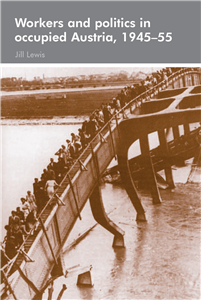Workers and politics in occupied Austria, 1945–55
by Jill Lewis
Description
More Information
Rights Information
Afghanistan, Aland Islands, Albania, Algeria, American Samoa, Andorra, Angola, Anguilla, Antarctica, Antigua and Barbuda, Argentina, Armenia, Aruba, Australia, Austria, Azerbaijan, Bahamas, Bahrain, Bangladesh, Barbados, Belarus, Belgium, Belize, Benin, Bermuda, Bhutan, Bolivia, Bonaire, Sint Eustatius, Saba, Bosnia and Herzegovina, Botswana, Bouvet Island, Brazil, British Indian Ocean Territory, British Virgin Islands, Brunei, Bulgaria, Burkina Faso, Burundi, Cambodia, Cameroon, Canada, Cape Verde, Cayman Islands, Central African Republic, Chad, Chile, China, Christmas Island, Cocos [Keeling] Islands, Colombia, Comoros, Congo [DRC], Congo [Republic], Cook Islands, Costa Rica, Cote d'Ivoire, Croatia, Cuba, Curaçao, Cyprus, Czech Republic, Denmark, Djibouti, Dominica, Dominican Republic, Ecuador, Egypt, El Salvador, Equatorial Guinea, Eritrea, Estonia, Ethiopia, Falkland Islands [Islas Malvinas], Faroe Islands, Fiji, Finland, France, French Guiana, French Polynesia, French Southern Territories, Gabon, Gambia, Georgia, Germany, Ghana, Gibraltar, Greece, Greenland, Grenada, Guadeloupe, Guam, Guatemala, Guernsey, Guinea, Guinea-Bissau, Guyana, Haiti, Heard Island and McDonald Islands, Honduras, Hong Kong, Hungary, Iceland, India, Indonesia, Iran, Iraq, Ireland, Isle of Man, Israel, Italy, Jamaica, Japan, Jersey, Jordan, Kazakhstan, Kenya, Kiribati, Kuwait, Kyrgyzstan, Laos, Latvia, Lebanon, Lesotho, Liberia, Libya, Liechtenstein, Lithuania, Luxembourg, Macau, Macedonia [FYROM], Madagascar, Malawi, Malaysia, Maldives, Mali, Malta, Marshall Islands, Martinique, Mauritania, Mauritius, Mayotte, Mexico, Micronesia, Moldova, Monaco, Mongolia, Montenegro, Montserrat, Morocco, Mozambique, Myanmar [Burma], Namibia, Nauru, Nepal, Netherlands, New Caledonia, New Zealand, Nicaragua, Niger, Nigeria, Niue, Norfolk Island, North Korea, Northern Mariana Islands, Norway, Oman, Pakistan, Palau, Palestinian Territories, Panama, Papua New Guinea, Paraguay, Peru, Philippines, Pitcairn Islands, Poland, Portugal, Puerto Rico, Qatar, Reunion, Romania, Russia, Rwanda, Saint Barthélemy, Saint Helena, Saint Kitts and Nevis, Saint Lucia, Saint Martin, French part, Saint Pierre and Miquelon, Saint Vincent and the Grenadines, Samoa, San Marino, Sao Tome and Principe, Saudi Arabia, Senegal, Serbia, Seychelles, Sierra Leone, Singapore, Sint Maarten (Dutch Part), Slovakia, Slovenia, Solomon Islands, Somalia, South Africa, South Georgia and the South Sandwich Islands, South Korea, South Sudan, Spain, Sri Lanka, Sudan, Suriname, Svalbard and Jan Mayen, Swaziland, Sweden, Switzerland, Syria, Taiwan, Tajikistan, Tanzania, Thailand, Timor-Leste, Togo, Tokelau, Tonga, Trinidad and Tobago, Tunisia, Turkey, Turkmenistan, Turks and Caicos Islands, Tuvalu, U.S. Minor Outlying Islands, U.S. Virgin Islands, Uganda, Ukraine, United Arab Emirates, United Kingdom, United States, Uruguay, Uzbekistan, Vanuatu, Vatican City, Venezuela, Vietnam, Wallis and Futuna, Western Sahara, Yemen, Zambia, Zimbabwe
Endorsements
In March 1946 Winston Churchill warned the world about the 'Iron Curtain' that had descended across Europe and behind which now lay, he said, the eight capitals of the ancient states of central and Eastern Europe. In fact, one of these eight, Vienna, escaped absorption into the Soviet bloc. Between 1945 and 1955, Austria and its capital were occupied by the Four (increasingly mutually antagonistic) Allied Powers. During this decade of confusion, insecurity, suspicion and fear, and confronted by poverty and the threat of famine, Austria's political and economic elites joined forces to promote a culture of political unity and harmony from which eventually emerged the Austrian model of corporatism, commonly referred to as the Social Partnership. Conservatives, Socialists and Communists initially co-operated in a coalition government, industrialists embraced nationalisation, and union leaders abandoned class conflict, accepting wage controls in return for a role in national policy formation. However, by 1948 the two Super-Powers were competing for influence in the country: the USA through the Marshall Plan and the USSR by asserting what it considered to be its rights in the country. Food shortages and low wages started to lead to grass-roots protest, which union leaders opposed and Austrian Communists sought to exploit. These culminated in two mass strikes in 1950, wrongly dubbed the 'September Putsch'. This book sets the social and economic difficulties that Austria encountered in this crucial decade in their international context and examines how they were contained. The author also discusses the long-term implications of the Austrian culture of consensus, not only for the way in which the country dealt with its recent past, but also for present-day political developments. A remarkable study that will be essential reading for students and scholars of twentieth-century European history. -
Author Biography
Jill Lewis is Senior Lecturer in the Department of History, University of Wales Swansea
Manchester University Press
Manchester University Press is a leading UK publisher known for excellent research in the humanities and social sciences.
View all titlesBibliographic Information
- Publisher Manchester University Press
- Publication Date January 2015
- Orginal LanguageEnglish
- ISBN/Identifier 9780719073519
- Publication Country or regionUnited Kingdom
- FormatPaperback
- Primary Price 34.95 USD
- Pages232
- ReadershipProfessional and scholarly
- Publish StatusPublished
- Dimensions234 X 156 mm
- IllustrationMaps
- Reference CodeIPR4263
Manchester University Press has chosen to review this offer before it proceeds.
You will receive an email update that will bring you back to complete the process.
You can also check the status in the My Offers area

Please wait while the payment is being prepared.
Do not close this window.



